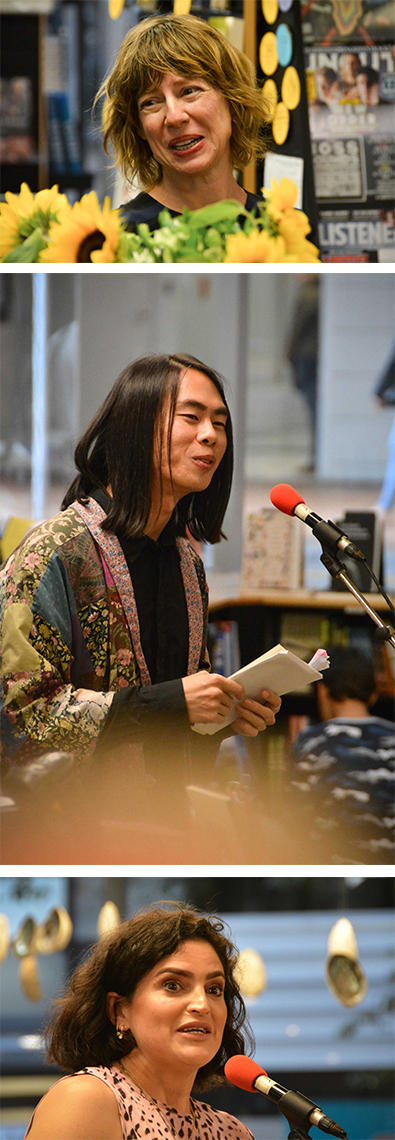
Gregory Kan – Under Glass
This is a book you can read like a novel or inhabit like a dream, and remember afterwards with that sense of resonance dreams give you.
Like Greg’s first collection, This Paper Boat, this collection is intricately structured, with complex layering and an innovative approach to form and narrative.
We begin with geography: ‘On one side of the river is a colossal jungle, a green so dark it’s nearly black, and on the other is a sandy plain patched with tall grass.’ Throughout the collection, we are returned to this space, in short prose paragraphs, and we follow the protagonist’s journey as if dreaming a dream with them, or as if playing a video game – this space has the hyperreal quality of a fantasy that seems full of meaning, a metaphor for an important message you can’t quite grasp.
It has an inexorable logic to it: the river leads to the sea; when we get to the sea, we head towards a lighthouse; where there is a door, we go through it, where there are stairs, we descend; below the stairs, there is a trapdoor, and under the trapdoor, there are more stairs. Wherever we go is realised with precise detail: the banks of the river are muddy, the lighthouse basement smells of urine, a giant pile of letters and notes is rotting at the base where it rests on the damp ground.
It is not an entirely comfortable place, and, the poet writes, ‘because I don’t know if this even is a place, I’m not sure I can ever leave’ – yet it is a place that allows for continual movement. It felt very spacious to me even as we went down stairs into chambers and passages – at one point, we are given the Persian word for labyrinth, meaning ‘a thousand insides’, ‘a thousand withins’ – and I felt that sense of possibility and immensity in every one of these small compact prose poems.
I haven’t even got to the second sun which shines on each of them – or from within each of them – or within the poet – or reflects the poet – or lets the poet through – but I want to allow some time for the other poems in the book. Those small prose poems are interspersed throughout another narrative, or another series of poems, double-spaced on the page, poems which have a wonderful combination of lightness and depth to them. Where the prose poems are concrete in their imagery yet resonate with metaphorical significance, the poems set out as free verse are more abstract on the surface, but they read as both precise and elusive in their analysis of shifting emotions, the ways two people can move each other, the ways power operates as ‘a place from which to speak . . . a hand opening / towards what seems like forever.’
These are beautifully constructed poems, often patterned with repetitions unfolding as in a complex nursery rhyme, or moving as if round corners of thinking, so that apparently simple ideas keep finding surprising complications: ‘You haunt me properly’, reads a line in one poem, that continues, ‘Confusing myself is a way to be honest’, and while I am still recognising in this some familiar truth I am trying to work out, the poem moves on, ‘Confusing you with something inside me / is a way for me to lie to myself / to tell you the truth’ and this does seem to speak a profound truth about the way relationships work, and how poetry works. A truth can’t be simply stated; even when it is as simply stated as some of the statements in these poems, there are other ways of coming at it, or ways of coming at its other side, or at other truths; a truth will be haunted by the other, and by the inside self, and by the metaphors that construct it, and move it through a thinking mind and a poetic construction.
This is my favourite kind of reading – reading that moves me onwards, lightly, like the most compelling fantasy, or like a dream, that I cannot resist and do not want to resist, buoyant like a boat, but a boat on deep waters, so that even as I read on, I have a sense of depth, and although I find myself reading through the whole collection easily, quickly, I also find myself haunted by the poems even while I am still reading, and afterwards too, so I have to keep going back to find the lines in my head and compare them with lines on the page, and read whole poems over and over for the rhythm of them, the patterning I love more and more on every reading. This is a book you need to keep, and keep by you.
Sugar Magnolia Wilson – Because a Woman’s Heart is Like a Needle at the Bottom of the Ocean
From the Dear Sister poems that open the collection, to the concluding Pen Pal sequence I have loved with a passion since it was published as a concertina chapbook by Cats and Spaghetti Press in 2014, this collection addresses the reader who is not always quite the reader from a voice that is not always quite the poet’s voice, with astonishing intimacy and power. In this collection are poems in which a girlfriend and boyfriend translate their understandings and misunderstandings of each other and each other’s culture from English into Korean and from Korean into English; poems about the strange translations of sleep and exhaustion; poems about secrets and loss, lonely dancing and surreal levitation. It is a rich and strange collection of full of startling images, absorbing ideas, deep shadows and glittering attractions.
The Dear Sister sequence of letter poems plunges us in to a world that is both familiar and full of surprises, seen through the fierce sensibility of the kind of woman to look a gift horse in the mouth hearing it as a message ‘asking me not to be myself’: ‘Dear Sister’, she writes, ‘I have been gifted a horse by Elizabeth and Ernest (I have decided not to use familial pleasantries any more). I haven’t ridden her yet because I haven’t been to see her although she has been here for a week now.’ Yet the more she recounts the details of her stubborn resistance and her interpretation of what this gift to her means, the more she evokes her own longing and desire, and it is a relief to read the small poem two pages on that reads in its entirety, ‘Dear sister, I have named the horse. She is Lilith.’ As she goes on in later letters to describe the rides she and Lilith share, you think Ernest and Elizabeth may have known better than she realises what they were doing. She is not someone easily won or lightly let go. A poem that begins, ‘Today I have decided to write to you as if I were a man’ takes us into the age of the industrial revolution, and the sister writing as a man begins to feel herself – or himself – ‘like a great train carrying a cargo of personal industry forward into the future’, covering the surrounding lands ‘in my grease and grime’, relishing his ruining of the world even as he, or she, comes to the conclusion that men ‘will ruin absolutely everything.’ We may not quite know what the ‘He whose name will never cross my lips’ has done, but we know whose side we are on.
In the wonderful interview with Paula Green posted on Poetry Shelf yesterday, Magnolia talks about Keely O’Shannessy’s cover design for the book. She says: ‘My friend Kerry Donovan-Brown said it’s like someone took a blood sample from me, put it in a petri dish and looked at it under a microscope, and that the cover is what close up Magnolia Wilson blood looks like!’ which she takes as the ‘best compliment ever.’ Like Magnolia Wilson’s ‘dream blood’, these poems reward close attention, being full of wonderful details: men waving radishes, a grief tree carried down to a letterbox where a grape-sized spider waves its front legs in salutation, Frankenstein’s monster ‘with one hand a virgin’s couth paw, the other an executioner’s ironic fist’, Anne Boleyn bearing ‘the claw marks of past lives’, the palm of a hand on a knee like a gold-coin donation. The characters in these poems long for intimacy, long to touch, and as a reader you find yourself close to the most forbidding characters – Anne who ‘would have chewed the top off Mary’s head’; the teachers with swing parrot earrings talking about daughters who aren’t you, who are ‘beautiful at science’, whose ‘algebra is simply magnifique’.
But nothing is more frightening than love and intimacy, and the quietest poems in the collection are the ones you will find almost overwhelming in the quietness and depth of the love and the grief they carry. I don’t want to say too much about some of these poems – you will read them quietly, you will bring your own griefs to them, they will surprise you and haunt you and console you, because above all this is a book full of love.
– Anna Jackson is Associate Professor of English at Victoria University of Wellington
Images courtesy of John Duke
